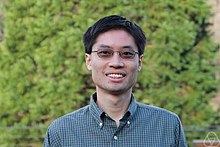Po-Shen Loh: Difference between revisions
Appearance
Content deleted Content added
No edit summary Tags: Mobile edit Mobile web edit |
No edit summary Tags: Mobile edit Mobile web edit |
||
| Line 3: | Line 3: | ||
|name=Po-Shen Loh |
|name=Po-Shen Loh |
||
|native_name=罗博深 |
|native_name=罗博深 |
||
|alma_mater=[[California Institute of Technology]] <small>([[Bachelor of Science| |
|alma_mater=[[California Institute of Technology]] <small>([[Bachelor of Science|BS]])</small><br/>[[Cambridge University]] <small>([[Part III of the Mathematical Tripos|MASt]])</small><br/> |
||
[[Princeton University]] <small>([[ |
[[Princeton University]] <small>([[PhD]])</small> |
||
|work_institutions=[[Carnegie Mellon University]]}} |
|work_institutions=[[Carnegie Mellon University]]}} |
||
Revision as of 21:35, 15 June 2018

Po-Shen Loh | |
|---|---|
| 罗博深 | |
| Alma mater | California Institute of Technology (BS) Cambridge University (MASt) Princeton University (PhD) |
| Scientific career | |
| Institutions | Carnegie Mellon University |
Po-Shen Loh is an associate professor of mathematics at Carnegie Mellon University[1] and currently the national coach of the United States' International Math Olympiad team.[2][3] Under his coaching, the team won the competition in 2015[4] and again in 2016, their first victories since 1994.[5][6] He had previously won a silver medal for the US as a participant in 1999.[7] Loh runs a popular course to train students for the William Lowell Putnam Mathematical Competition known as Putnam Seminar[8], and is the founder of the educational website Expii.[5][9][10] In alternating semesters he teaches CMU's undergraduate course on discrete mathematics and the graduate seminar on extremal combinatorics. [11]
References
- ^ "Po-Shen Loh". Retrieved 2018-02-25.
- ^ "International Mathematical Olympiad". www.imo-official.org. Retrieved 2017-12-24.
- ^ Sostek, Anya (2017-08-14). "More than 300,000 students entered a math contest. The top score came from a 16-year-old in Pittsburgh Public Schools". Pittsburgh Post-Gazette. Retrieved 2017-12-28.
{{cite news}}: Cite has empty unknown parameter:|dead-url=(help) - ^ "They're No. 1: U.S. Wins Math Olympiad For First Time In 21 Years". All Things Considered. National Public Radio. 2015-07-18. Retrieved 2017-12-28.
{{cite news}}: Cite has empty unknown parameter:|dead-url=(help) - ^ a b Strauss, Valerie (2016-07-18). "U.S. students win prestigious International Math Olympiad — for second straight year". Washington Post. ISSN 0190-8286. Retrieved 2017-12-28.
{{cite news}}: Cite has empty unknown parameter:|dead-url=(help) - ^ "Count One More Gold For The U.S. — In Math". FiveThirtyEight. 2016-08-25. Retrieved 2017-12-28.
{{cite news}}: Cite has empty unknown parameter:|dead-url=(help) - ^ "International Mathematical Olympiad". www.imo-official.org. Retrieved 2018-03-25.
- ^ "Carnegie Mellon University Putnam Seminar". www.math.cmu.edu. Retrieved 2018-01-08.
- ^ Antonick, Gary (2016-07-08). "U.S. Team Wins First Place at International Math Olympiad". Wordplay Blog. The New York Times. Retrieved 2017-12-28.
{{cite news}}: Cite has empty unknown parameter:|dead-url=(help) - ^ Tyre, Peg (2016). "The Math Revolution". The Atlantic. Retrieved 2017-12-28.
{{cite news}}: Cite has empty unknown parameter:|dead-url=(help) - ^ http://www.math.cmu.edu/~ploh/teaching.shtml
